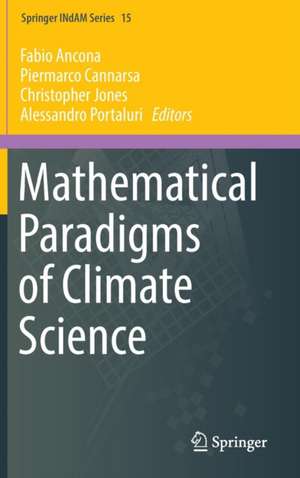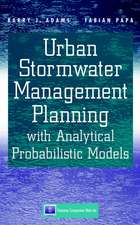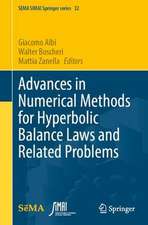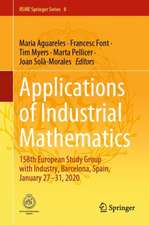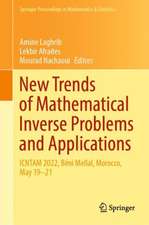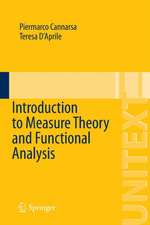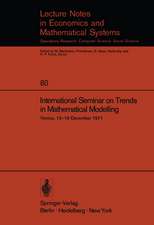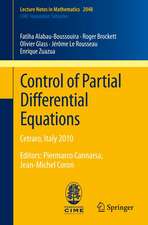Mathematical Paradigms of Climate Science: Springer INdAM Series, cartea 15
Editat de Fabio Ancona, Piermarco Cannarsa, Christopher Jones, Alessandro Portalurien Limba Engleză Hardback – 14 noi 2016
| Toate formatele și edițiile | Preț | Express |
|---|---|---|
| Paperback (1) | 384.86 lei 6-8 săpt. | |
| Springer International Publishing – 3 mai 2018 | 384.86 lei 6-8 săpt. | |
| Hardback (1) | 392.21 lei 6-8 săpt. | |
| Springer International Publishing – 14 noi 2016 | 392.21 lei 6-8 săpt. |
Din seria Springer INdAM Series
- 15%
 Preț: 638.43 lei
Preț: 638.43 lei - 18%
 Preț: 1113.89 lei
Preț: 1113.89 lei - 18%
 Preț: 1229.10 lei
Preț: 1229.10 lei - 18%
 Preț: 1123.35 lei
Preț: 1123.35 lei - 18%
 Preț: 1235.43 lei
Preț: 1235.43 lei - 18%
 Preț: 1110.72 lei
Preț: 1110.72 lei - 15%
 Preț: 649.87 lei
Preț: 649.87 lei - 18%
 Preț: 1121.76 lei
Preț: 1121.76 lei - 18%
 Preț: 1227.84 lei
Preț: 1227.84 lei - 18%
 Preț: 1382.21 lei
Preț: 1382.21 lei - 20%
 Preț: 557.21 lei
Preț: 557.21 lei -
 Preț: 406.42 lei
Preț: 406.42 lei -
 Preț: 392.75 lei
Preț: 392.75 lei -
 Preț: 391.99 lei
Preț: 391.99 lei - 15%
 Preț: 651.19 lei
Preț: 651.19 lei - 15%
 Preț: 651.34 lei
Preț: 651.34 lei - 15%
 Preț: 706.81 lei
Preț: 706.81 lei - 15%
 Preț: 647.92 lei
Preț: 647.92 lei - 15%
 Preț: 647.08 lei
Preț: 647.08 lei - 18%
 Preț: 795.68 lei
Preț: 795.68 lei - 15%
 Preț: 644.18 lei
Preț: 644.18 lei - 15%
 Preț: 645.28 lei
Preț: 645.28 lei - 18%
 Preț: 951.89 lei
Preț: 951.89 lei - 18%
 Preț: 801.05 lei
Preț: 801.05 lei - 15%
 Preț: 705.83 lei
Preț: 705.83 lei - 18%
 Preț: 1056.71 lei
Preț: 1056.71 lei - 15%
 Preț: 525.54 lei
Preț: 525.54 lei - 15%
 Preț: 528.80 lei
Preț: 528.80 lei - 18%
 Preț: 736.94 lei
Preț: 736.94 lei - 15%
 Preț: 587.02 lei
Preț: 587.02 lei - 15%
 Preț: 702.24 lei
Preț: 702.24 lei - 15%
 Preț: 652.31 lei
Preț: 652.31 lei - 15%
 Preț: 705.72 lei
Preț: 705.72 lei - 18%
 Preț: 891.72 lei
Preț: 891.72 lei
Preț: 392.21 lei
Nou
Puncte Express: 588
Preț estimativ în valută:
75.07€ • 81.57$ • 63.10£
75.07€ • 81.57$ • 63.10£
Carte tipărită la comandă
Livrare economică 22 aprilie-06 mai
Preluare comenzi: 021 569.72.76
Specificații
ISBN-13: 9783319390918
ISBN-10: 3319390910
Pagini: 250
Ilustrații: X, 228 p. 36 illus., 29 illus. in color.
Dimensiuni: 155 x 235 x 14 mm
Greutate: 0.51 kg
Ediția:1st ed. 2016
Editura: Springer International Publishing
Colecția Springer
Seria Springer INdAM Series
Locul publicării:Cham, Switzerland
ISBN-10: 3319390910
Pagini: 250
Ilustrații: X, 228 p. 36 illus., 29 illus. in color.
Dimensiuni: 155 x 235 x 14 mm
Greutate: 0.51 kg
Ediția:1st ed. 2016
Editura: Springer International Publishing
Colecția Springer
Seria Springer INdAM Series
Locul publicării:Cham, Switzerland
Cuprins
1 Christof Meile and Chris K. R. T. Jones: A mathematical perspective on microbial processes in Earth's biogeochemical cycles.- 2 Fatiha Alabau-Boussouira, Piermarco Cannarsa and Masahiro Yamamoto: Source reconstruction by partial measurements for a class of hyperbolic systems in cascade.- 3 Didier Auroux, Jacques Blum and Giovanni Ruggiero: Data assimilation for geophysical fluids: the diffusive back and forth nudging.- 4 Alberto Carrassi and Stéphane Vannitsem: Deterministic treatment of model error in geophysical data assimilation.- 5 Franco Flandoli: Remarks on stochastic Navier-Stokes equations.- 6 Jan Gairing, Michael Högele, Tetiana Kosenkova and Alexei Kulik: On the calibration of Lévy driven time series with coupling distances and an application in paleoclimate.- 7 Damon McDougall and Chris K. R. T. Jone:, Decreasing flow uncertainty in Bayesian inverse problems through Lagrangian drifter control.- 8 Takahito Mitsui and Michel Crucifix: Effects of additive noise on the stability of glacial cycles.- 9 Francesco Paparella: Turbulence, Horizontal Convection, and the Ocean's Meridional Overturning Circulation.- 10 Alessio Porretta and Enrique Zuazua: Remarks on long time versus steady state optimal control.
Textul de pe ultima copertă
This book, featuring a truly interdisciplinary approach, provides an overview of cutting-edge mathematical theories and techniques that promise to play a central role in climate science. It brings together some of the most interesting overview lectures given by the invited speakers at an important workshop held in Rome in 2013 as a part of MPE2013 (“Mathematics of Planet Earth 2013”). The aim of the workshop was to foster the interaction between climate scientists and mathematicians active in various fields linked to climate sciences, such as dynamical systems, partial differential equations, control theory, stochastic systems, and numerical analysis. Mathematics and statistics already play a central role in this area. Likewise, computer science must have a say in the efforts to simulate the Earth’s environment on the unprecedented scale of petabytes. In the context of such complexity, new mathematical tools are needed to organize and simplify the approach. The growing importance of data assimilation techniques for climate modeling is amply illustrated in this volume, which also identifies important future challenges.
This timely work is mainly addressed to any researcher active in climate science to learn more on qualitative and quantitative methods recently developed for their discipline as well as mathematicians with a strong interest in environmental science. It may also be useful to PhD students in applied mathematics to find excellent research subjects for their thesis.
Caracteristici
Provides an overview of cutting-edge mathematical theories and techniques that promise to play a central role in climate science Offers a truly interdisciplinary approach, bringing together researchers with distinct views and methods Emphasizes the growing importance of data assimilation techniques for climate modelling
